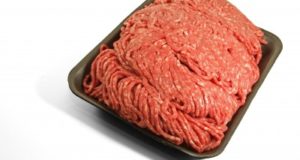|
Listen To The Article
|
When you buy processed food, either at the grocery store or at your favorite fast food place or even restaurant, are you sure you’re getting what you’re paying for?
The patrons at an undisclosed fast food restaurant in London can’t be, as meaty chunks in a lamb curry were found to contain not one ounce of lamb.
 Or pork, chicken, beef, horse or goat.
Or pork, chicken, beef, horse or goat.
In fact, DNA testing couldn’t identify the meat at all, and after eliminating every creature under the sun (including human flesh), lab experts were left with one of two results: the meat came from either a dog or a cat.
In a BBC3 documentary “The Horsemeat Banquet,” investigators in the UK found disturbing evidence of not just tainted lamb curry, but a variety of meats in takeout foods and meals supplied to daycare centers, schools, and senior care centers.
A beef burger tested contained no beef, with the exception of beef blood and heart. And the “beef” in a black bean dish contained chicken blood and scraps, but hardly any beef at all. In fact rogue meat is a serious problem across the United Kingdom, whose suppliers include Eastern Europe and Ireland.
In January, the UK supermarket chain Tesco ran full-page ads apologizing for selling hamburgers which contained nearly 30 percent horse meat. Tested beef burgers also contained pig meat. And one of the UK’s most popular fast food chains, Burger King, stopped using one of the suppliers implicated in the scandal.
“This is a voluntary and precautionary measure,” Burger King said. “We are working diligently to identify suppliers that can produce 100 percent pure Irish and British beef products that meet our high quality standards.”
According to Reuters, the meats were from processing plants owned by Liffey Meats and Silvercrest Foods in Ireland, and Dalepak Hambleton in Britain. This scandal has rocked Ireland’s beef industry, which accounts for 21 percent of the country’s food exports.
The more steps involved in the process of getting your food from hoof to plate means that many more ways for possible contamination to occur. While those of us in the US have not seen horse meat mixed into our Burger King burgers, the CDC has linked a recent salmonella outbreak to ground beef from Michigan-based Gab Halal Foods and Jouni Meats.
Food manufactured on American soil is no guarantee of safety. Most of our meats sold in grocery stores and restaurants come from confined animal feeding operations, where thousands and tens of thousands of animals are housed in conditions where harmful bacteria can flourish.
According to a February article on the Mercola website, one study found that over 23 percent of caged hens in confined animal feeding operations tested positive for salmonella. Contaminated chicken poop and body parts used for fertilizer and animal feed can spread the disease throughout the food chain. Big Ag is becoming an increasing threat to consumer health.
Over 800 records of food fraud have been added to the US Pharmacopeial Convention database. Anyone can search the USP Food Fraud database or report instances of food fraud. Because of the complexity of the food supply chain in modern civilization, it is important that we become more aware of just exactly where our food is coming from and what it contains.
Better yet, join a CSA (community supported agriculture) or start your own homesteading operation and keep 100 percent control over the food that your family eats.
 Off The Grid News Better Ideas For Off The Grid Living
Off The Grid News Better Ideas For Off The Grid Living



